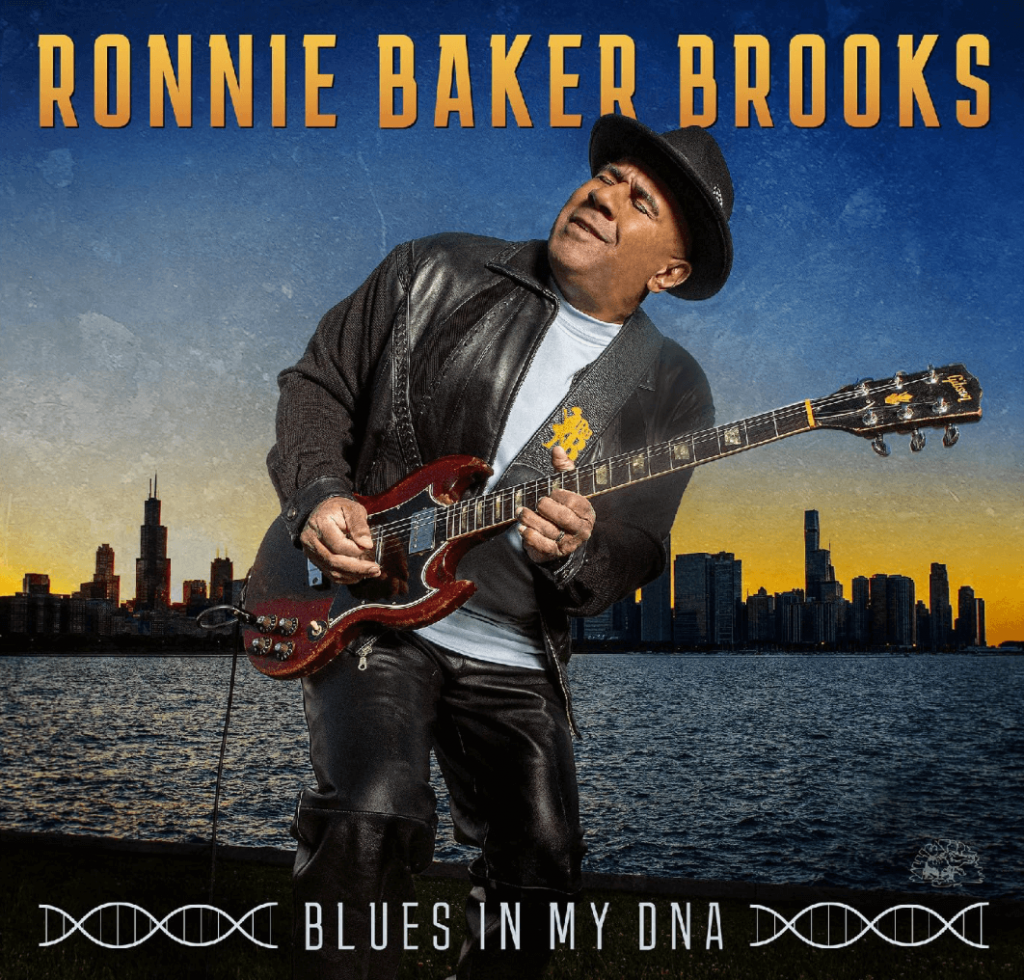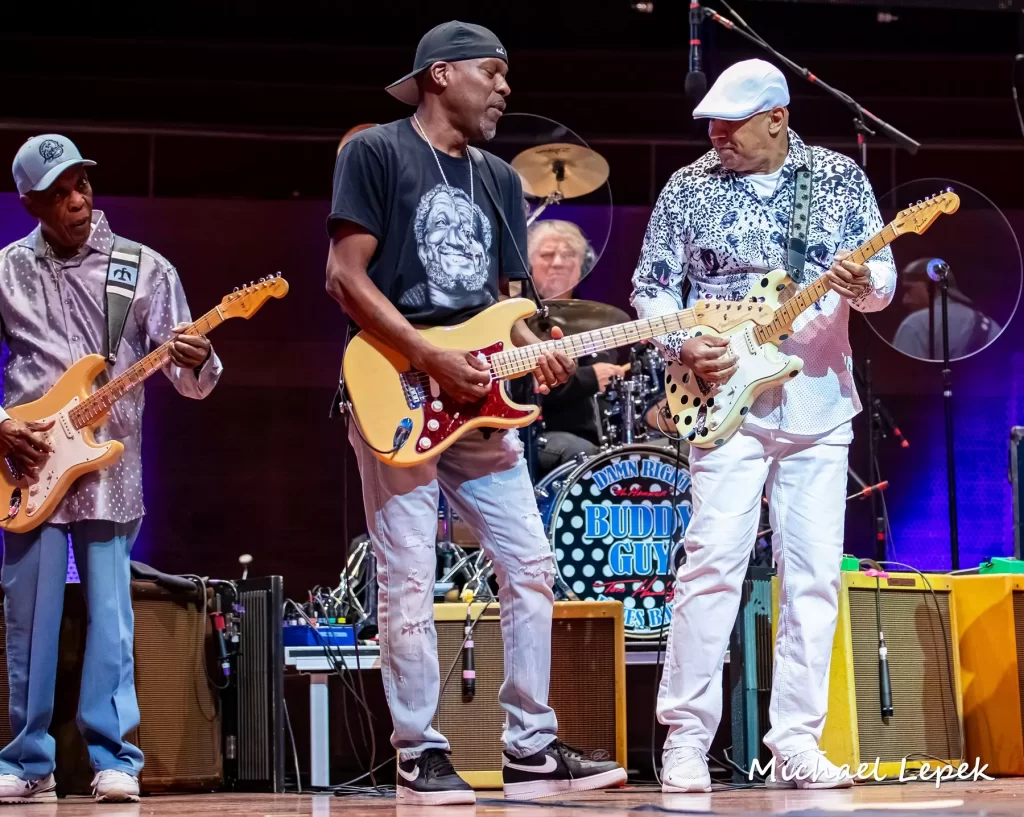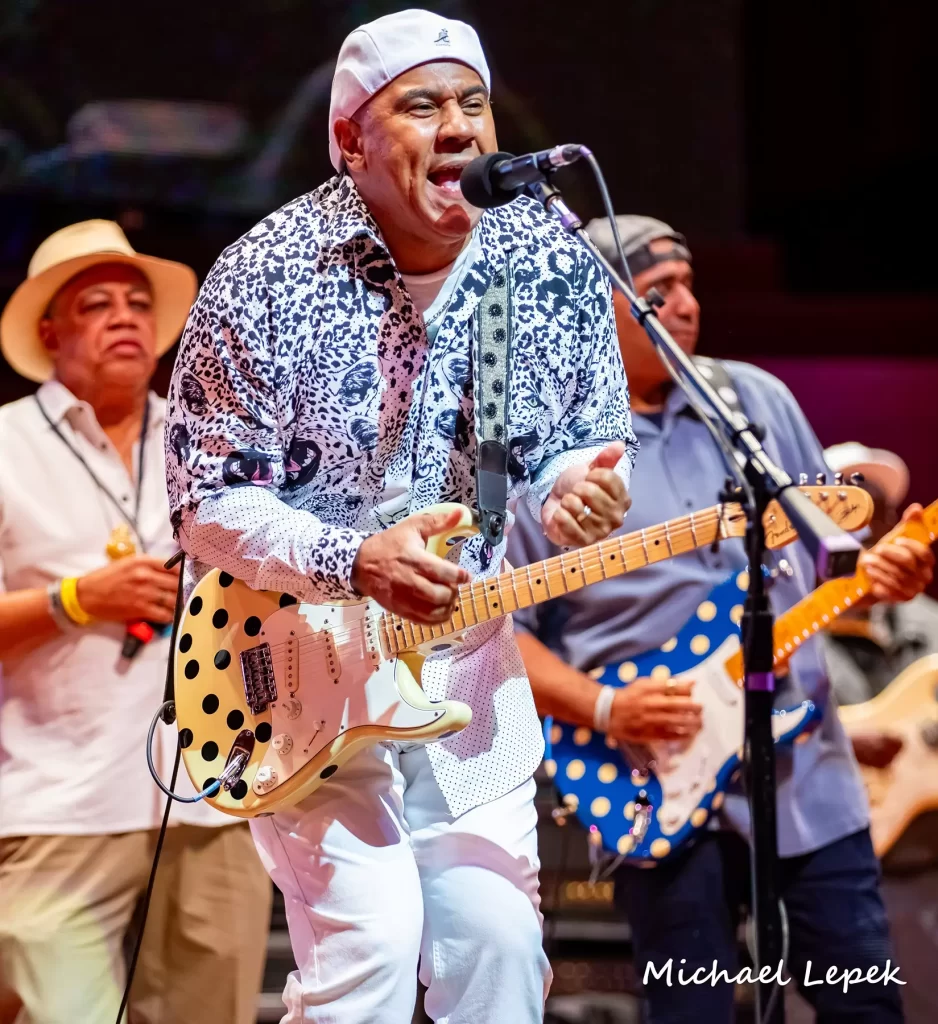When Ronnie Baker Brooks‘ father, veteran bluesman Lonnie Brooks, passed away, the Associated Press called and asked Ronnie what he wanted his dad to be known for.
His answer says a lot about how important family is: “Some people know him as a great artist, a great blues artist, but along with being a great blues artist I would like him to be known as an amazing father. He got us out of situations where you could go left or right as far as being good or bad, and gave us a platform to be what we are today.”
The title of Ronnie’s new album is Blues in My DNA: 12 songs that cover the wide expanse of the blues from rock steady to soul, love songs to hard luck ballads.
“Just like my song ‘Blues in My DNA,’ we grew up in the ghetto, man. It was rough. My father was very strict on education, and I remember when it was the third or fourth grade and I got on the honor roll, and they gave me two tickets to the circus. We didn’t have $5 in the house, man. My dad didn’t have a vehicle at the time. He went to the pool room and (won) money to take me to the circus, and we took the L train in Chicago to go to the circus.
“He told me, ‘If you do good in school, you get rewarded. But if you don’t, I can’t reward you.’ When I came home with honor roll grades and tickets, all we had to do was get there. He found a way to make sure we got there. That’s the kind of man he was.” From personal experience Lonnie knew life as a bluesman is not easy. “He had a day job. So, (early on) he had to play what was on the radio, the top 40.”
The numbers on Blues In My DNA were written over a long period of time. “‘Stuck on Stupid’ I recorded on my first record. That’s almost 20 years old. ‘All True Men’ I wrote with Todd Park Mohr. We wrote that song together 13, almost 14 years ago. ‘Make You Do Right,’ I wrote that, and it might have been right after (the title cut of my 2018 album) ‘The Times Have Changed.’ I didn’t use it on that record. I love writing, and dad instilled that in me and my brother Wayne to keep writing. Even if you don’t use the songs, you might use them later, and some of these songs came out in that way.”
Dad may be gone, but he will never be forgotten. “He was my hero, man. I remember watching him on Soul Train and Hee Haw with Ray Charles. I was so proud that this was my father. I was looking at the TV saying, ‘I love you, man. Ooh, that could be me.’ And when he came home, I asked him ‘Did you hear me talking to you on TV?’ He made me feel good. I did not understand certain things as far as business or whatever. I got lost in that to be honest, Don. I got lost in that. It was all passion.
“I was around my dad a lot as a kid. I would play bass lines. My brother Wayne would play drums or some pots and pans with some spoons. So, we were always around. He would recruit us. He would always have different styles of music.
“When I was an adult and I got my own band, it started to change. My dad kicked me out of his band. I recorded my first CD, Goldigger (1998), and I was thinking I was gonna stay with the band with him to promote the record and go out on my own when he wasn’t working. But (dad said) ‘That ain’t gonna work, son. There are gonna be too many conflicts. You gotta go.’ And I cried. I said, ‘No, Dad. We’re a team,’ and he’s like, ‘No, you got to go out and be a solo artist.’”
One particular memory related to a conversation in the back of Lonnie’s tour bus. “He had the whole room to himself, and I just went back in there to check on him. I thought I was disturbing him. ‘No, no, Come on in. Sit down. Playing with you is my dream come true. It didn’t come through like I wanted it to, but here we are. We’re on the tour bus out on the road playing gigs all together.’”
In his heart, Ronnie knew his dad was sending him out on his own for his own good. “To be honest, I knew it then, but I know it for sure now. You know, at first, I was skeptical. I knew it was time to go, but I thought I could do it either way. But he knew the way. He knew the way! ‘Naw, you got to do it this way!’
Lonnie passed away in 2017. “Towards the end he moved in with me and my wife in my house, and we took care of my father. Every day when my wife went to work, me and my dad would sit down and have breakfast. We’d start talking, and he would hand me tips.
“He was almost godlike to me. As I got older, he became an influence. He became my boss. And the last quarter of his life he was my best friend.”

Commonly, blues artists start out on a label, establish themselves and eventually go out on their own. Ronnie is doing just the reverse. He’s been on his own label, on Provogue, and others. The recently released Blues in My DNA is out now via Alligator Records.
“I needed help, Don. I started recording from the ground up with a physical mailing list. That was back in the ’90s before the internet was what it is now, and e-mail was the easiest way of communication back then. I had my mother and my sister helping me. They both passed, and I had goals.”
Most of his father’s work at the height of his career was with Alligator Records. “My dad did a lot of work over there at Alligator and allowed me to have a platform to grow from, and I know how they did with him. My manager supported me having a meeting with (Alligator CEO) Bruce Iglauer. Apparently the feeling was mutual, and we made the deal. I try to record what I feel,” Ronnie says about the new release.
Ronnie has often played the Chicago Blues Festival. This year he was a co-headliner with Shemekia Copeland. “We opened the Fest. She closed it. That was Thursday. Sunday, Buddy Guy closed it, the last show of the Fest. He invited me, Wayne, and Billy Branch in the middle of the jam session. I told him Shemekia was standing on the side. He called out Shemekia.”


At 57 Ronnie Baker Brooks is doing dad proud. “When you’re young and vibrant. you know you could easily go the wrong way. Dad gave us a way to say, ‘Hey, this the way to go. Keep your ego in check. Stay humble. Work hard, stay hungry, and do the right thing. Make sure when you make decisions that you’re able to sleep with yourself because if it goes well, go right. If it goes bad, you can’t blame anybody. You just get through it.’”